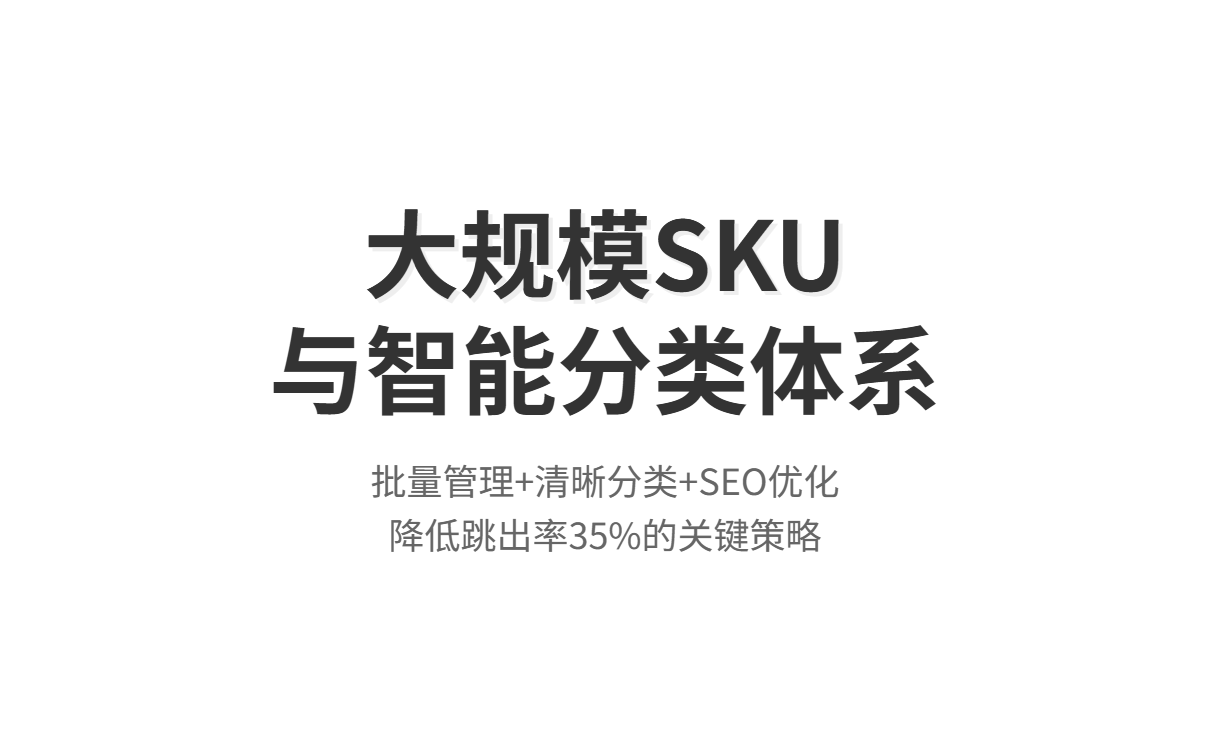 400-076-6558智领未来,外贸超级营销员
400-076-6558智领未来,外贸超级营销员
 400-076-6558智领未来,外贸超级营销员
400-076-6558智领未来,外贸超级营销员
Anyone in the home goods and small commodities export business knows the harsh reality of the industry: numerous SKUs, rapid updates, and short product lifecycles. However, precisely because of this, independent export websites for consumer goods require a higher level of expertise than those for machinery, hardware, or tools. Many business owners mistakenly believe that "building a website is enough to create an independent website," but a website that truly generates inquiries must possess the unique demand structure specific to the consumer goods industry.
AB Customer Related Recommendations:
2026 Guide to Building, Marketing, and Acquiring Customers on Foreign Trade B2B Websites
A home goods brand might launch hundreds of new products every quarter: cups, storage boxes, gardening tools, kitchen gadgets, cleaning supplies, freebies/small commodities, seasonal items... If a website cannot quickly list products, quickly categorize them, and quickly adjust its structure, its traffic will drop.
Therefore, you are not building a website, but a traffic machine capable of handling high SKUs, large-volume updates, and SEO growth .
The following are essential requirements summarized from the customer's perspective, which are also common pitfalls for many in the industry.
Consumer goods websites are most afraid of slow uploads, complex editing, disorganized product structures, and non-standard URLs. The pain points of traditional website building are: uploading a single product takes 10-15 minutes, and with many SKUs, it's simply impossible to upload them all.
| Comparison items | Traditional website building | AB Customer Smart Independent Website |
|---|---|---|
| Upload method | Manual single upload | Batch import Excel files |
| URL generation | Manual settings or system random settings | Automatically generate SEO-friendly URLs |
| Product Description | Completely handwritten | AI-generated quickly |
Users often leave consumer goods websites quickly because they can't find categories, the same product appears in multiple series, or they can't see the complete product matrix under a series. In the consumer goods industry, "categorization clarity" is even more important than homepage design.

Consumer goods products have high search volume, but also high competition. If your product page SEO isn't professional enough, you'll have virtually no chance of ranking on Google. High requirements include: each product must have a unique URL, support for title/description/H structure optimization, support for multiple images and videos, support for file downloads, support for automatic tag association, and support for automatic site map generation.
Ordinary website builders struggle to achieve this, and many sites don't even have H1 or ALT tags. Professional independent e-commerce websites, however, have built-in e-commerce SEO structures, automatically standardizing their processes once products are listed.
The consumer goods industry covers a vast geographical area, including different markets such as South America, the Middle East, Europe, Southeast Asia, Africa, and Russia, each with its own language. While typical website creation usually focuses on English, multilingual markets represent a significant new traffic pool.
According to Google data, 72% of consumers prefer to browse product information in their native language, and multilingual websites can increase international traffic and inquiries by an average of more than three times.
Especially for companies dealing in small commodities, gifts, and fast-moving consumer goods, you'll find that many overseas buyers directly inquire, save images, and compare products via mobile phone. Regular websites either lag or have poor layout.
Studies show that for every second increase in mobile loading time, conversion rates drop by 7%. A fast website is a competitive advantage.
In the consumer goods industry, prices are transparent, and buyers are increasingly focused on: the availability of a supply chain, design capabilities, customizability, stable supply, and rapid response times. Therefore, websites must offer features such as: one-click WhatsApp contact, quick inquiry forms, floating contact bars, product saves, product comparison, multiple contact channels, and automatic visitor tracking.
From the customer's perspective, there are three main reasons:
Give your home and daily necessities independent website the ability to quickly list products, intelligently categorize them, support multiple languages, and achieve strong conversion rates.
Free trial of independent website solutions for the consumer goods industryFor the consumer goods industry, this means faster new product launches, faster growth in Google traffic, and more stable inquiries. To generate stable inquiries in this industry, an independent website must have a large SKU capacity, automated SEO structure, multilingual support, rapid product listing capabilities, a clear product matrix, powerful conversion tools, and a continuous content output capability. If these requirements are not met, traffic is simply out of the question.
AB Customer Recommendation:
2026 Guide to Building Independent B2B Websites for Foreign Trade
Content Marketing for Independent B2B Websites in Foreign Trade in 2026
2026 Professional Social Media Operation Channels for Foreign Trade B2B
Get free customs data for B2B foreign trade in 2026
2026 Foreign Trade B2B CRM Customer Management System
2026 Foreign Trade B2B Overseas Expansion Resource Navigation
.png?x-oss-process=image/resize,h_100,m_lfit/format,webp)
.png?x-oss-process=image/resize,h_100,m_lfit/format,webp)

.png?x-oss-process=image/resize,h_100,m_lfit/format,webp)
.png?x-oss-process=image/resize,h_100,m_lfit/format,webp)
.png?x-oss-process=image/resize,h_100,m_lfit/format,webp)
.png?x-oss-process=image/resize,h_100,m_lfit/format,webp)
